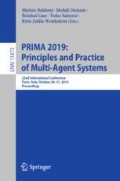Abstract
In manipulable multi-agent argumentation, each agent may transmit deceptive information to others for tactical motives. We contemplate epistemic states and their roles in deception/honesty detection and (mis)trust-building. We propose the use of intra-agent preferences for handling deception/honesty detection and inter-agent preferences for determining which agent(s) to believe in more. We illustrate how deception/honesty in an argumentation of an agent, if detected, may alter the agent’s perceived trustworthiness, and how that may affect agents’ judgement as to which arguments they should accept. A detailed comparison to an earlier study on deception detection highlights wider applicability of our approach.
Access this chapter
Tax calculation will be finalised at checkout
Purchases are for personal use only
Notes
- 1.
“\(\textsf {and}\)” instead of “and” is used when the context in which the word appears strongly indicates classic-logic truth-value comparisons. Similarly for \(\textsf {or}\) (disjunction) and \(\textsf {not}\) (negation).
- 2.
\(e_1\) cannot be certain \(a_5\) is factual to \(e_2\), since, firstly, there may or may not be Detective in a game, and, secondly, it could be Civilian who is bluffing to be Detective.
- 3.
Recall \(e_2\) knows \(e_1\) knows \(a_1\); as such, \(a_1\) appears in \(e_2\)’s model of \(e_1\)’s preference-adjusted local agent argumentation. Recall also it is a common knowledge that Killer does not know whether there be Detective; as such, from \(e_2\)’s perspective, neither \(a_4\) nor \(a_5\) is known by \(e_1\) to be factual to \(e_2\).
- 4.
Since every public argumentation is known to every agent, the converse is not possible.
References
Amgoud, L., Vesic, S.: Rich preference-based argumentation frameworks. Int. J. Approximate Reasoning 2, 586–606 (2014)
Arisaka, R., Hagiwara, M., Ito, T.: Formulating manipulable argumentation with intra-/inter-agent preferences. CoRR, abs/1909.03616 (2019)
Arisaka, R., Satoh, K., van der Torre, L.: Anything you say may be used against you in a court of law. In: Pagallo, U., Palmirani, M., Casanovas, P., Sartor, G., Villata, S. (eds.) AICOL 2015-2017. LNCS (LNAI), vol. 10791, pp. 427–442. Springer, Cham (2018). https://doi.org/10.1007/978-3-030-00178-0_29
Dung, P.M.: On the acceptability of arguments and its fundamental role in nonmonotonic reasoning, logic programming, and n-person games. Artif. Intell. 77(2), 321–357 (1995)
Kontarinis, D., Toni, F.: Identifying malicious behavior in multi-party bipolar argumentation debates. In: Rovatsos, M., Vouros, G., Julian, V. (eds.) EUMAS/AT -2015. LNCS (LNAI), vol. 9571, pp. 267–278. Springer, Cham (2016). https://doi.org/10.1007/978-3-319-33509-4_21
Kuipers, A., Denzinger, J.: Pitfalls in practical open multi agent argumentation systems: malicious argumentation. In: COMMA, pp. 323–334 (2010)
Rahwan, I., Larson, K.: Mechanism design for abstract argumentation. In: AAMAS, pp. 1031–1039 (2008)
Sakama, C.: Dishonest arguments in debate games. In: COMMA, pp. 177–184 (2012)
Author information
Authors and Affiliations
Corresponding author
Editor information
Editors and Affiliations
Rights and permissions
Copyright information
© 2019 Springer Nature Switzerland AG
About this paper
Cite this paper
Arisaka, R., Hagiwara, M., Ito, T. (2019). Deception/Honesty Detection and (Mis)trust Building in Manipulable Multi-Agent Argumentation: An Insight. In: Baldoni, M., Dastani, M., Liao, B., Sakurai, Y., Zalila Wenkstern, R. (eds) PRIMA 2019: Principles and Practice of Multi-Agent Systems. PRIMA 2019. Lecture Notes in Computer Science(), vol 11873. Springer, Cham. https://doi.org/10.1007/978-3-030-33792-6_28
Download citation
DOI: https://doi.org/10.1007/978-3-030-33792-6_28
Published:
Publisher Name: Springer, Cham
Print ISBN: 978-3-030-33791-9
Online ISBN: 978-3-030-33792-6
eBook Packages: Computer ScienceComputer Science (R0)

